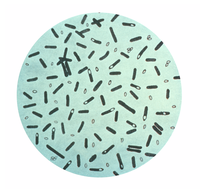
Photo from wikipedia
Bacterial spores survive high pressure processing (HPP). Group II Clostridium botulinum is an obligate anaerobe spore-forming pathogen that can produce the botulinum neurotoxin under refrigeration. This study assessed nontoxigenic type… Click to show full abstract
Bacterial spores survive high pressure processing (HPP). Group II Clostridium botulinum is an obligate anaerobe spore-forming pathogen that can produce the botulinum neurotoxin under refrigeration. This study assessed nontoxigenic type E C. botulinum and Group II Clostridium sp. growth in raw and HPP (550 MPa, 3 min, 10 °C) Thai coconut water (CCW; pH 5.2). No spore germination or growth occurred in HPP CCW inoculated with 105 CFU/ml after 61 days regardless of oxygen concentration (<0.5 - 11 mg/l) or storage temperature (4 and 20 °C). Spore concentration decreased by 3.0 ± 0.1 log CFU/ml in a worst-case scenario consisting of non-HPP filter-sterilized CCW (pH 7.0) under anoxic incubation at 30 °C during 61 days, suggesting spore germination followed by cellular death. Supplementing filter-sterilized CCW (pH 7.0) with selected germinants and free amino acids did not support spore development, but the addition of nutrient-rich laboratory media (TPGY broth) at low concentrations (6.25%) promoted growth, suggesting that a lack of nutrients prevents C. botulinum development in CCW. Further risk assessment will require evaluating other CCW varieties and toxin production.
Journal Title: Food research international
Year Published: 2020
Link to full text (if available)
Share on Social Media: Sign Up to like & get
recommendations!